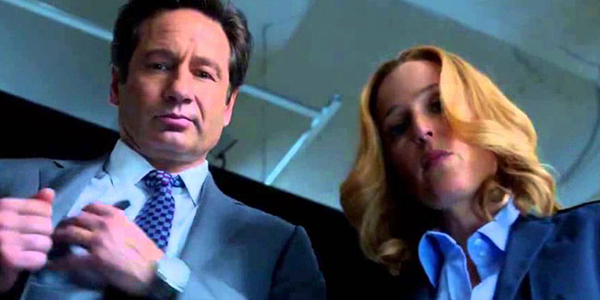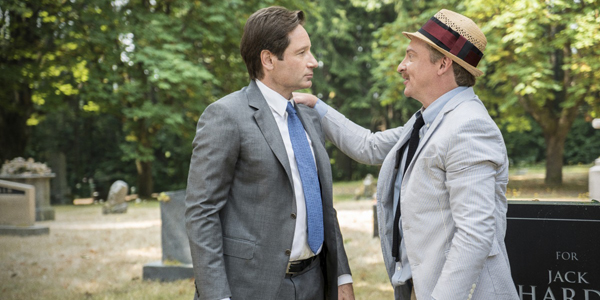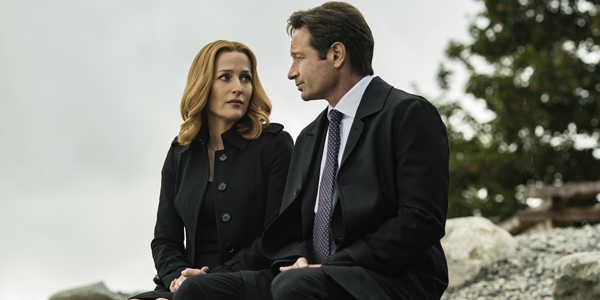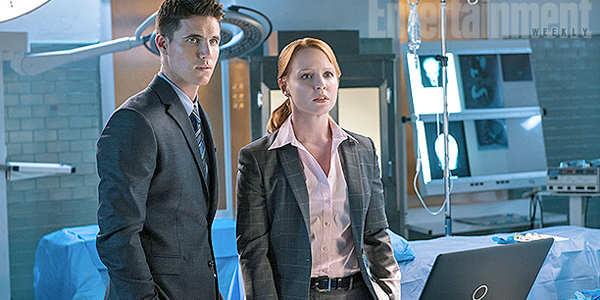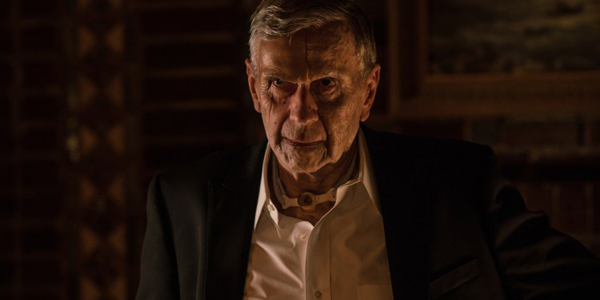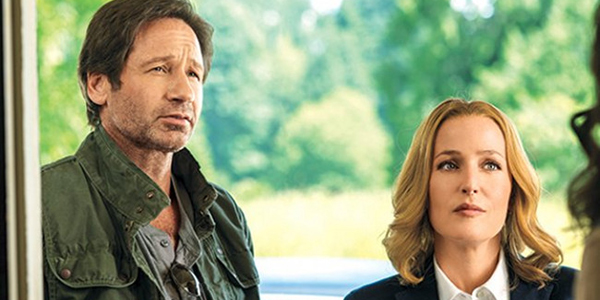
Digging Deeper into The X-Files 6-Episode Event Series!
Earlier this week I posted my overall thoughts on The X-Files six-episode event series (or “season 10” as it is being referred to in many places). Here now is a more detailed episode-by-episode analysis:
Episode 1 — “My Struggle” — This was a very rocky beginning to the relaunch. One of the biggest surprises/disappointments of this six-episode event season was the low quality of the three episodes that X-Files creator/show-runner Chris Carter wrote and directed. His two “My Struggle” episodes (that bookended the season) were just terrible. This felt like the “Cliff’s Notes” version of an X-Files episode, with way too much plot jammed into the hour. Nothing had time to breathe and none of the characters behaved in a way that made sense to me.
In the timeline of the show, Mulder and Scully have now been away from the X-Files for well over a decade. The event that brings them back to the FBI needs to be MOMENTOUS. But in this episode, it’s a nothing. The Bureau contacts Mulder and Scully just because a right-wing talk-show host (Joel McHale) wants to speak to them? Why is this the inciting event for these new episodes? Why, at the end of the events of this hour, do Mulder and Scully decide to return to the FBI? Why does the FBI take them back? None of that is clearly established. The episode also fumbles on explaining what Mulder and Scully have been up to since the events of 2008’s second movie, I Want to Believe. That film was all about the two of them getting their faith back, each of them in what they want to believe. But what have they been up to since then? I am OK with breaking the two of them up, even though it smacks of a desire to reset everything to the old status quo of the original series. (One of the huge mis-steps of the later years of the show, and that second movie, was having Mulder and Scully get together OFF CAMERA. We still never learned exactly how and why they got together after years of sexual tension. Nor was it ever made 100% clear that Mulder fathered baby William. But more on that in a moment.) But since it was established in the second movie that these two had been a couple for years, I would have liked this episode to have more clearly established what went wrong.
A lot of things happen in this episode but not much of it makes any sense. Why does one conversation with this young woman Sveta (The Americans’ Annet Mahendru, a wonderful actress totally wasted here) convince Mulder that everything he has believed in for so long is a lie? (Mulder gives a speech in the episode mocking how ridiculous it was that he ever believed in, among other things, faceless aliens setting people on fire. That was hugely annoying for me, since I loved the development of that story-line in the fifth season — of an alien civil war happening far away from our planet, whose ripple effects were nonetheless affecting us — and had been hoping for years that that would eventually build to something. Oh well.) The episode implies that maybe Mulder has a thing for Sveta, and also that maybe Scully has a thing for Tad O’Malley (Joel McHale), but like everything in this episode it’s all way too rushed and so none of it lands.
The best part of this episode is seeing David Duchovny and Gillian Anderson back as Mulder and Scully. That brought me great joy. I wish the new characters were interesting. The idea of the Tad O’Malley character has merit, but he’s not fleshed out at all, he’s mainly there to deliver exposition. We don’t get to know Sveta at all before she gets blown up. (I was sure that she’d pop up again later in the six episodes, but I was wrong.) And the doctor who was there at the UFO crash in the fifties becomes just another in a long string of wild-eyed Mulder informants. He has no character and adds nothing to the show. (When I saw an early photo, months ago, of this young glasses-wearing guy standing next to a UFO, I’d gotten excited and assumed that this mini-season would be bringing back Gibson Praise, the psychic kid who we were told was so important but we never learned exactly what his deal was or what eventually happened him. It would have been super-cool to have gotten some resolution to Gibson’s story, but my guess was totally wrong and Gibson is nowhere to be found in these episodes.)
This episode also contains one of the most puzzling continuity issues of the whole show. We see Mulder step on and tear his “I Want to Believe” poster on the floor of his old FBI office. But we saw that poster hanging in his cabin in 2008’s I Want to Believe, set years after he left the FBI. And I think we actually also see it in his cabin in this very episode!! (Though I need to re-watch to be sure.) Regardless, we see the poster, restored, hanging up in later episodes. So… what happened? Just how many of those posters does Mulder have, anyways?
My joy at watching a new episode of The X-Files for the first time in a decade and a half carried me through this episode. But it was a rough start to the mini-series.
Episode 2 — “Founder’s Mutation” — This was a step in the right direction but also an episode with a lot of flaws. I was very confused at the beginning — why are Mulder and Scully back in their old jobs at the FBI? Did that happen between episodes? All of Mulder’s X-Files files, which the last episode told us had apparently all gone missing, have been returned? How or why? It’s a very weird choice to have all of this essentially happen off-camera and to open with Mulder and Scully back at work at the FBI as if none of the past decade-and-a-half had happened. I think the story of Mulder & Scully’s return to the FBI should have been given a lot more time and attention. Oh well.
This is the first of four “monster-of-the-week” episodes. I like the idea behind this story but, like the first episode, it feels way too rushed. This was a cool story that needed a lot more time to breathe, and so that we could get more resolution at the end. What happened to all those kids at the end of the episode??
It felt like weird writerly overkill to have, in this episode, a weird company run by a mysterious man who insists on being addressed as “the founder,” while at the same time dealing with a medical situation known as a “founder’s mutation,” with those two things apparently entirely unconnected in the story. That didn’t make sense to me.
My favorite parts of the episode were the two deeply emotional sequences in which Mulder and Scully imagined what their lives would have been like had they not given up baby William for adoption. Those sequences were gorgeously shot and very moving. In an episode in which I wanted a lot more explanation and clarification, I loved the subtlety of those sequences, and how it was left for the audience to decide on their meaning. Lovely. I wasn’t expecting William — one of the weirder and less satisfying plot elements of the final two seasons of the show — to ever be mentioned again, so color me pleasantly surprised that William was such a strong story-point throughout this short season. (Though now we really do need to get a strong resolution to that story in whatever future X-Files episodes/films are coming in the future.)
I am thrilled that James Wong (who wrote and directed this episode), who was so critical to The X-Files’ early success, came back to helm an episode of this relaunch.
Episode 3 — “Mulder and Scully Meet the Were-Monster” — Darin Morgan wrote four episodes during the original X-Files run, and they were among the very best episodes the show ever did. “Jose Chung’s From Outer Space” is without question my favorite episode of the entire series. And so I was ecstatic when I learned that Mr. Morgan would be writing one of these six new X-Files episodes. He directed this episode, too, and boy did he not let me down. This episode is so joyous, so funny and so fun, that I had a huge smile on my face as I watched it. As is to be expected from a Darin Morgan episode, “Mulder and Scully Meet the Were-Monster” is packed to the gills with funny one-liners, bizarre happenings, and a lot of winking fun with the character of Mulder. (That shot of Mulder sleeping in his tight red bikini briefs is one for the ages.) Scully comments, at one point: “This is how I like my Mulder,” and I entirely agree. Rhys Darby and X-Files super-fan Kumail Nanjiani (you’ve got to check out his The X-Files Files podcast) did great work in their guest-appearances. This was without question a high-point of this mini-season.
Episode 4 — “Home Again” — Glen Morgan (who, with James Wong, was a key player in the early days of The X-Files) wrote and directed this episode and, coming on the heels of “Mulder and Scully Meet the Were-Monster,” it’s another really strong episode. Everyone, myself included, was misled by the title to expect a sequel to Morgan and Wong’s horrific fourth season episode “Home,” but this episode turns out to be something entirely different.
The show has two strong story-lines. The emotional center of the episode is about Scully and the death of her mother (a welcome return appearance from actress Sheila Larkin, who appeared so often and so memorably as Scully’s mother in the original show). This is a very sweet, emotional story-line, and it provides an excellent showcase for Gillian Anderson, who really shines in this episode. I was pleasantly surprised by the strong connections this episode had to the whole history of the show, particularly the parallels drawn between Scully’s vigil at her mother’s bedside and Mulder’s vigil at the bedside of a comatose Scully in “One Breath” from the second season. That was a huge surprise and a really nice touch. This was a strong story on its own but the connections to earlier episodes strengthened it.
I also quite enjoyed the parallel “monster of the week” adventure, in which a trash-Golem wreaks havoc on enemies of the city’s homeless. This was a great, classic X-Files monster. And I enjoyed the parallels between this monster adventure and Scully’s emotional arc, specifically her feelings that she threw away her son William. Though boy did Mulder and Scully fail to accomplish anything this week, as the monster killed a lot of victims before Mulder & Scully figured out what was going on!
Episode 5 — “Babylon” — After two strong episodes in a row, this was a bit of a step backwards. There is a lot in “Babylon” that is ridiculous, most particularly Mulder’s lunatic plan to take mushrooms and then somehow psychically enter the mind of a comatose terrorist. This episode made Mulder look far too much like a loony tune. The episode didn’t give us anything to help sell how Mulder thought his taking drugs would allow him to accomplish this incredible psychic feat. As outlandish as this all was, and how borderline incompetent Mulder and Scully both seemed in this episode, the total crazy lunacy of Mulder’s honky-tonk drug trip made this episode worth watching. That was a crazy few minutes of television. Loved the way they snuck the Lone Gunmen in there (though man I was disappointed that we didn’t see them return for real in any of these episodes). I also enjoyed the introduction of the young Mulder and Scully doppelgangers, Agents Einstein and Miller (Lauren Ambrose & Robbie Amell). Like “Founder’s Mutation,” this episode had some interesting ideas (the need to someone enter the mind of a comatose terrorist) but needed a lot more time for the story to breathe and for the characters to be fleshed out.
Episode 6 — “My Struggle II” — This bookend to the opener, once again written and directed by Chris Carter, was another huge misfire and a frustrating way to end this run of episodes. Once again, this feels like the “Cliff’s Notes” version of an X-Files episode, with way too much plot jammed in without nearly enough time for any sort of coherent narrative progression and/or character development. (In one striking example, Mulder goes from being sweaty and a little fluish to unconscious on the floor and completely incapacitated in the span of a commercial break.) Scully sees one patient in her hospital with a lesion and immediately jumps to the conclusion that a global pandemic is about to emerge. Just how exactly did she arrive at that conclusion? Soon after, though, also between commercial breaks, the show tries to sell the idea that a global pandemic HAS in fact emerged, and that all of mankind goes from feeling fine to at-death’s-door within the matter of a few hours. It’s so ridiculous as to be laughable. And don’t get me started on Scully’s miraculous ability to sequence her entire genome, and then develop a vaccine to the unstoppable doomsday virus, in the matter of a few hours, mostly alone in a darkened room in her small hospital.
As with most of these episodes, there are some interesting ideas at play. We first learned that something might be up with people’s smallpox innoculations back in season two, and the first X-Files movie gave us the suggestion that the Syndicate would release an outbreak and then seize control of the globe and establish a “secret government” through FEMA. I wish this episode had made the FEMA connections explicit, but otherwise there are some interesting connections to the established mythology, and this episode presents an interesting twist on some of the end-of-the-world scenarios that X-Files fans might have been envisioning. But the lightning-fast way in which this all unfolds in this episode is crazy. This virus spreads across the entire globe, leading to the collapse of power-grids and even the global internet, in just a matter of hours? Ridiculous. CSM mentions that this all began in 2012, which is a nice nod to continuity as we had learned in earlier X-Files episodes that “the date is set” for the alien colonization, and in the series finale we learned that this would take place in 2012. (Presumably there was once a plan to release an X-Files movie in 2012 to tell that story.) But if the process of releasing this global virus began in 2012, as CSM seems to suggest, then how do things go from zero to armageddon in just a few hours in this episode?? How was this super-virus released. How did CSM turn off the immune system of everyone in the world? Why would they give Scully immunity when they abducted her? Who is CSM working with (since the rest of the Syndicate were killed by the faceless aliens back in season seven)?
None of this makes much sense, and the story is further damaged because, as I commented in my previous post, the show clearly did not have the budget to bring this global apocalypse to life. All we get are a few unconvincing shots of a traffic-packed Washington, DC street, and lots of scenes of Joel McHale’s character alone in a room. Come on. We needed to see this play out on a global scale. We needed to see how the President and the military would have responded to these events. If this is supposed to be the culmination of the entire X-Files story and the plot of the Syndicate, then we need to see this happen, not just have characters tell us about it in huge blocks of exposition.
I liked seeing Monica Reyes again, that was a fun surprise. But the idea that she has been working with CSM for a decade, helping to bring about the end of the world, seems like a total destruction of that character. I am all for TV characters having flaws and making bad choices, but for this huge twist to have worked we needed to know a lot more about why Monica chose to throw in with CSM and what she’s been doing for the past decade. Instead, she’s just there to deliver exposition (that’s more confusing than helpful). She’s just as wasted as Skinner. (Who also pops up here for one short scene and basically does nothing.) Why couldn’t Skinner have been more involved in this story? Instead, we spend a ridiculous amount of time with the newly-introduced agents Einstein and Miller. These characters worked as one-off Mulder/Scully parallels in “Babylon,” but bringing them back here as important recurring characters only illuminates how one-dimensional and uninteresting they are. Either one of them should have been replaced by Skinner.
The episode ends on a whopper of a cliffhanger. As much as this is the exact opposite of the type of resolution I was hoping for with this mini-series, I’ve gotta sort of admire the guts of Chris Carter and his team to end it this way, assuming that somehow and somewhen and somewhere, the show will return to continue this story.
Overall, as you can tell, I had tremendous problems with this X-Files revival. It did not at all live up to my hopes. Still, I am thankful for the miracle that we got these six new stories with these great characters, Mulder and Scully. I hope that we’ll see additional episodes in the coming years. I hope Chris Carter can regain his mojo and remember how to tell great X-Files stories again. (Or, I hope that he hands off the reins to someone else for future episodes, though I don’t see that happening.) I hope that Vince Gilligan and Frank Spotnitz are able to contribute to future episodes. Most of all, whenever the day comes that we do get the definite final adventure of Mulder and Scully, I hope that these characters, and this series, get the closure that they, and it — and we, the loyal audience — deserve.

